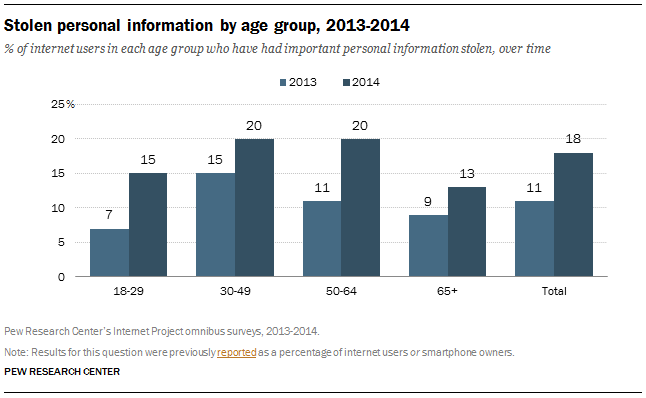Consumers have faced a hellish few months of security threats, from the Target data breach to last week’s Heartbleed bug. With these kinds of perils on the rise — and attracting major media attention — it’s not hugely surprising that more online Americans say they’ve experienced a personal data breach.
The Pew Research Center today released the results of a January 2014 survey, which suggests data theft is on the rise. Of the 1,002 adults surveyed, 18 percent reported that their important personal information — social security numbers, credit card data, and banking information — has been swiped by nefarious parties. That’s a huge bump from the 11 percent that reported personal information theft in a July 2013 survey.
Meanwhile, 21 percent of online adults said they’ve had their email or social networking accounts compromised or hijacked without their permission. That’s consistent with the July 2013 survey, in which 21 percent of respondents reported compromised email or social accounts.
While every age bracket reported more stolen personal information this time around, the biggest increases came in the 18-29 and 50-64 age groups. Just half a year later, more than twice as many young adults (18-29) reported stolen personal information.

It’s worth noting that these are personally reported figures, not cases of data theft independently verified by experts. Some portion of the increase is likely the result of security-focused media coverage (this survey took place roughly one month after Target disclosed its massive data breach). Conversely, hackers swipe important data from some Internet users without them ever realizing.
“There have clearly been mainly high-profile and large-scale data breaches over the past six months, and that may have prompted people to review their statements and accounts more closely,” Mary Madden, a senior researcher for Pew’s Internet & American Life Project, told VentureBeat. “And there’s the larger backdrop of the NSA revelations, which has likely heightened public awareness of data security more generally. These questions reflect one touchpoint in this larger story — that a rising share of the public say they have experienced a personal data breach.”
Forthcoming studies from Pew will reflect how these experiences affect peoples’ behavior and perceptions toward cyber security, said Madden.
Whatever the exact figures are, the message is clear: The web is not completely secure. But there are lots of steps you can take to protect your data online, like using two-factor authentication and complex (or randomly generated) passwords.
Updated at 10:46 AM PST with comment from Pew researcher Mary Madden
VentureBeat's mission is to be a digital town square for technical decision-makers to gain knowledge about transformative enterprise technology and transact. Learn More







![Reblog this post [with Zemanta]](http://img.zemanta.com/reblog_e.png?x-id=e4efa30d-96ef-4fd5-9a72-8a0fa458189a)
